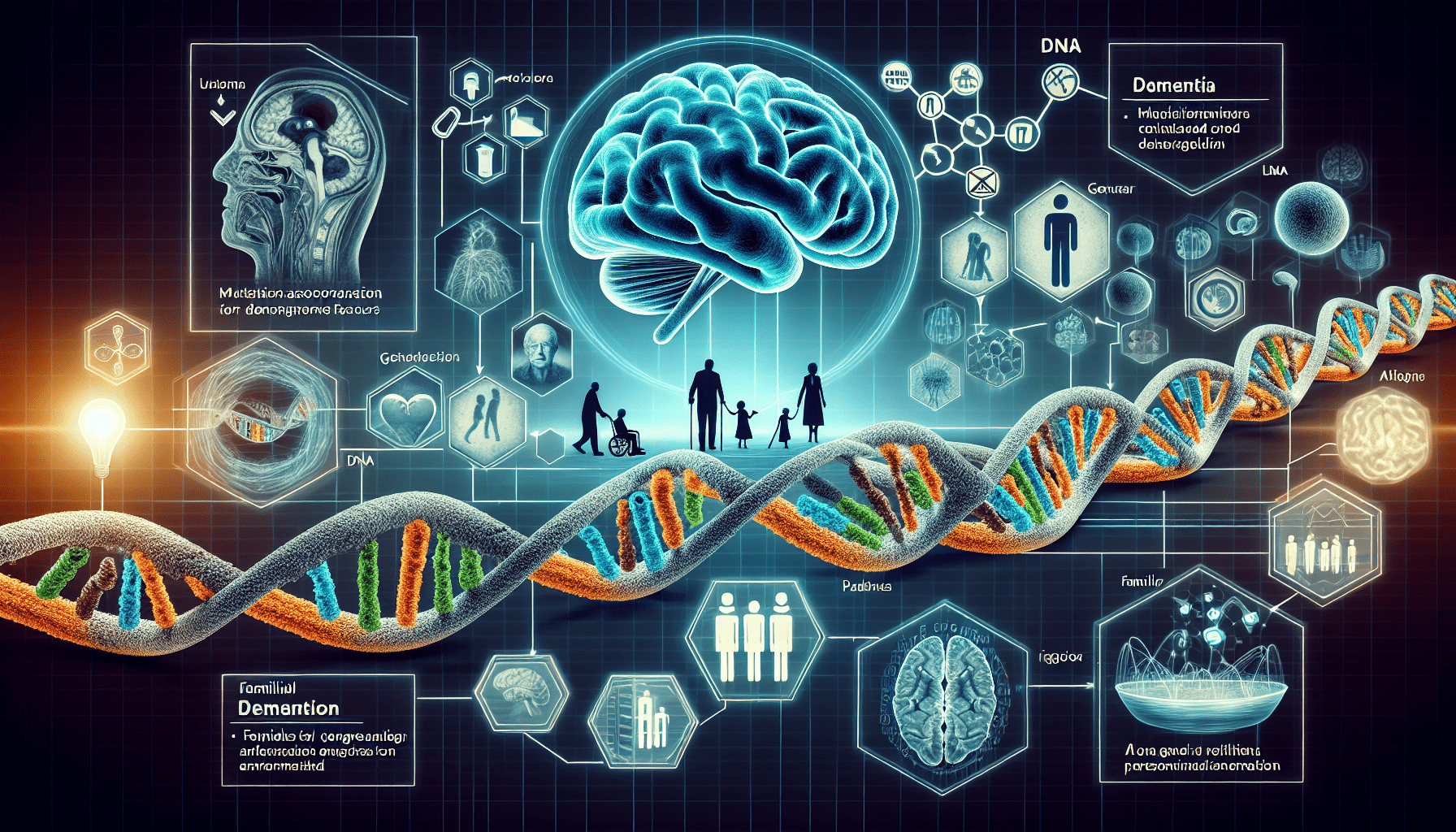Have you ever wondered if dementia can be passed down through your genes? In this article, we will dive into the fascinating world of genetic factors that contribute to the development of dementia. While many people are familiar with the term dementia, understanding the genetic factors behind this condition can shed new light on its origins and potential treatments. Join us as we explore the intricacies of genetics and its connection to dementia, and discover the latest research findings in this field. Get ready to unravel the mysteries of your DNA and unlock valuable insights into the world of dementia.
Overview of Dementia
Dementia is a term that refers to a group of symptoms that impact memory, cognitive function, and social abilities. It is not a specific disease but rather a collection of symptoms that can be caused by various conditions or diseases affecting the brain. The most common type of dementia is Alzheimer’s disease, but there are several other types as well.
Definition of dementia
Dementia is characterized by a decline in memory, thinking, and reasoning skills, which become severe enough to interfere with daily life. It is a progressive condition, meaning it worsens over time, and it often affects older individuals. However, dementia can also occur in younger individuals, a condition known as early-onset dementia.
Different types of dementia
There are various types of dementia, each with different causes and symptoms. Some of the most common types include Alzheimer’s disease, vascular dementia, Lewy body dementia, and frontotemporal dementia. Each type of dementia has its own distinct set of symptoms, progression patterns, and underlying causes.
Common symptoms of dementia
The symptoms of dementia can vary depending on the specific type and stage of the condition. However, there are some common symptoms to look out for. These may include memory loss, difficulty in finding words, confusion, changes in mood or behavior, difficulty with coordination or motor skills, and a decline in problem-solving abilities. It is important to note that experiencing one or more of these symptoms does not necessarily mean a person has dementia, as they can be caused by other factors as well.
The global impact of dementia
Dementia is a significant global health issue, affecting millions of people worldwide. According to the World Health Organization (WHO), it is estimated that around 50 million people currently live with dementia, and this number is projected to increase significantly in the coming years. Dementia not only has a profound impact on individuals and their families but also places a considerable burden on healthcare systems and society as a whole. It is crucial to understand the genetic factors that contribute to dementia in order to develop effective prevention strategies and treatments.
Understanding Genetics and Heredity
Explaining the concept of genetics
Genetics is the study of genes and how they are inherited from parents to offspring. Genes are segments of DNA that contain instructions for the development and functioning of our bodies. They determine our physical traits, such as eye color and height, as well as play a role in our susceptibility to certain diseases or conditions.
Role of genes in disease
Genes can have a significant impact on disease development. Some diseases are caused by mutations or changes in specific genes, while others may involve the interaction of multiple genes or gene-environment interactions. Understanding the role of genes in disease can help in identifying individuals at risk and developing targeted prevention or treatment strategies.
Concept of heredity and its influence on health
Heredity refers to the passing of traits from parents to offspring through genes. Genetic factors inherited from parents can influence a person’s health and susceptibility to certain diseases, including dementia. While genes can increase the risk of developing certain conditions, it is important to note that they are not the sole determinant, and environmental and lifestyle factors also play a role.

Genetic Factors in Dementia
Exploring the role of genes in dementia
Genetic factors play a significant role in the development of dementia. In certain cases, mutations or variations in specific genes can substantially increase an individual’s risk of developing certain types of dementia. These genetic factors can alter the functioning of the brain, leading to the accumulation of abnormal proteins or the impairment of other crucial processes.
Common genetic mutations linked to dementia
Several genetic mutations have been identified that are associated with an increased risk of developing dementia. For example, mutations in the genes encoding amyloid precursor protein (APP), presenilin-1 (PSEN1), and presenilin-2 (PSEN2) have been linked to early-onset Alzheimer’s disease. Mutations in these genes can lead to the production and accumulation of amyloid plaques in the brain, a hallmark feature of Alzheimer’s disease.
Risk genes vs deterministic genes in dementia
Genetic variations associated with an increased risk of developing dementia can be classified into two categories: risk genes and deterministic genes. Risk genes, such as the APOE gene associated with late-onset Alzheimer’s disease, increase the likelihood of developing the condition but do not guarantee its occurrence. On the other hand, deterministic genes, like those involved in early-onset Alzheimer’s disease, directly cause the development of the disease.
Early-Onset Alzheimer’s and Genetic Factors
Role of genetics in early-onset Alzheimer’s
Genetic factors play a more prominent role in early-onset Alzheimer’s disease compared to late-onset cases. Early-onset Alzheimer’s typically develops before the age of 65 and can be attributed to specific genetic mutations. These mutations can disrupt normal brain functioning and lead to the degeneration of brain cells, resulting in the onset of dementia symptoms.
Mutations in APP, PSEN1, and PSEN2 genes
Mutations in genes such as APP, PSEN1, and PSEN2 are commonly associated with early-onset Alzheimer’s disease. The APP gene provides instructions for the production of amyloid precursor protein, which plays a role in the formation of amyloid plaques. Mutations in PSEN1 and PSEN2 genes affect the production and processing of presenilin proteins, contributing to the accumulation of abnormal proteins in the brain.
The impact of these mutations on brain functions
The mutations in genes involved in early-onset Alzheimer’s disease disrupt normal brain functions. The accumulation of amyloid plaques and abnormal proteins leads to the progressive degeneration of brain cells and the subsequent decline in cognitive abilities. As a result, individuals with these genetic mutations often experience memory loss, difficulties in problem-solving, and changes in behavior and personality.
Late-Onset Alzheimer’s and Genetic Factors
Role of genetics in late-onset Alzheimer’s
Late-onset Alzheimer’s disease is the most common form of dementia and typically occurs after the age of 65. Genetic factors also play a role in late-onset cases, but the influence is more complex compared to early-onset cases. The APOE gene has been identified as a significant genetic risk factor for late-onset Alzheimer’s disease.
Importance of APOE gene and its different forms
The APOE gene has different forms or alleles, including APOE ε2, APOE ε3, and APOE ε4. The APOE ε4 allele is associated with an increased risk of developing late-onset Alzheimer’s disease. Individuals who inherit one copy of the APOE ε4 allele have an increased risk, while those who inherit two copies have an even higher risk. Meanwhile, the APOE ε2 allele is associated with a decreased risk of Alzheimer’s disease.
Combination of genetic and environmental factors in late-onset Alzheimer’s
While the APOE ε4 allele is a significant genetic risk factor, it is important to note that not all individuals with the allele develop Alzheimer’s disease, and not all individuals without the allele are protected from the disease. Environmental factors, such as lifestyle choices and overall health, also play a role in the development and progression of late-onset Alzheimer’s disease.
Genetic Factors in Other Types of Dementia
Genetics and Vascular dementia
Vascular dementia is a type of dementia caused by reduced blood flow to the brain, resulting from damage to blood vessels. While genetic factors do not play a direct role in the development of vascular dementia, certain genetic variations can contribute to an individual’s susceptibility to vascular risk factors such as high blood pressure or diabetes, which are associated with increased risk of vascular dementia.
FRDA gene and Friedreich’s ataxia
Friedreich’s ataxia is a rare genetic disorder characterized by progressive damage to the nervous system. It is caused by mutations in the FRDA gene, which leads to a deficiency in the production of a protein called frataxin. While Friedreich’s ataxia primarily affects coordination and movement, individuals with the disease may also experience cognitive decline and develop dementia.
Genetics of Dementia with Lewy bodies
Dementia with Lewy bodies is characterized by the presence of abnormal protein deposits in the brain called Lewy bodies. While the exact cause of these protein deposits is unknown, genetic factors appear to play a role in some cases. Mutations in genes such as SNCA and LRRK2 have been associated with an increased risk of developing dementia with Lewy bodies.

Testing for Genetic Risks of Dementia
Using DNA sequencing to identify risk factors
DNA sequencing techniques can be used to analyze an individual’s genetic profile and identify any genetic variations associated with an increased risk of developing dementia. This can involve looking for specific mutations in genes known to be linked to dementia or analyzing the presence of risk alleles such as the APOE ε4 allele.
Benefits and limitations of genetic testing
Genetic testing for dementia can provide valuable information about an individual’s risk of developing the condition. It can help individuals make informed decisions about their health and potentially take preventive measures. However, it is important to consider the limitations of genetic testing, including the inability to predict the exact onset or severity of the disease and the potential psychological impact of receiving genetic risk information.
Ethical considerations in genetic testing for dementia
Genetic testing for dementia raises ethical considerations regarding privacy, informed consent, and the potential for discrimination based on genetic information. It is essential to have appropriate safeguards and regulations in place to ensure that genetic testing is conducted in an ethical and responsible manner, with the wellbeing of individuals as a top priority.
Guidelines for People with Genetic Risks
Early intervention strategies
For individuals identified as having a genetic risk of developing dementia, early intervention strategies can help mitigate the impact of the condition. This may include regular medical check-ups, a healthy lifestyle with a balanced diet and regular exercise, cognitive stimulation activities, and the management of any co-existing conditions such as high blood pressure or diabetes.
Adapting lifestyle changes to potentially slow progression
Certain lifestyle changes may help slow the progression of dementia, even in individuals with a genetic risk. These may include staying mentally and socially active, engaging in regular physical exercise, maintaining a healthy diet rich in fruits, vegetables, and whole grains, getting enough sleep, and avoiding smoking and excessive alcohol consumption.
Psychological preparation and coping mechanisms
A diagnosis of genetic risk for dementia can be emotionally challenging. Individuals and their families may benefit from psychological support and counseling to help them cope with potential future challenges. Building a strong support network, staying connected with loved ones, and learning about available resources can also greatly assist in adapting to the potential impact of dementia.

Advancements in Dementia Research
Revolutionary treatments under investigation
Researchers are actively investigating new treatments and therapies for dementia, including those targeting the genetic factors involved. Revolutionary approaches, such as gene therapy and gene editing, are being explored to potentially modify or correct the genetic mutations associated with dementia. These advancements hold promise for the development of more effective treatment options in the future.
Importance of genetic research in finding a cure
Genetic research is vital in understanding the underlying mechanisms of dementia and identifying potential targets for intervention. By studying the genetic factors involved, researchers can gain insights into disease pathways and develop innovative therapies that can ultimately lead to a cure or significant improvement in the management of dementia.
Clinical trials and their potential
Clinical trials play a crucial role in the advancement of dementia research. These trials help test the safety and efficacy of new treatments and interventions. By participating in clinical trials, individuals with genetic risks for dementia can contribute to the development of groundbreaking therapies and potentially benefit from access to novel treatments before they become widely available.
Conclusion: Genetics and the Future of Dementia
Predicting the potential of genetic therapy
With the increasing understanding of the genetic factors involved in dementia, there is hope for the development of targeted therapies that can halt or slow down the progression of the condition. Gene therapy and other innovative approaches have the potential to revolutionize dementia treatment in the future.
Implication of understanding genetics on public health strategies
Incorporating genetic knowledge into public health strategies can help identify high-risk individuals and implement preventive measures at an early stage. This can include genetic counseling, lifestyle interventions, and personalized healthcare approaches. Understanding the genetic factors of dementia enables a more proactive and personalized approach to dementia prevention and management.
Importance of continued research and public awareness
Despite significant progress in understanding the genetic factors of dementia, there is still much to learn. Continued research, funding, and public awareness are vital in further unraveling the complexities of the disease and developing effective interventions. By supporting dementia research and raising public awareness, we can work towards a future where the impact of dementia is minimized, and individuals at risk receive the care and support they need.


